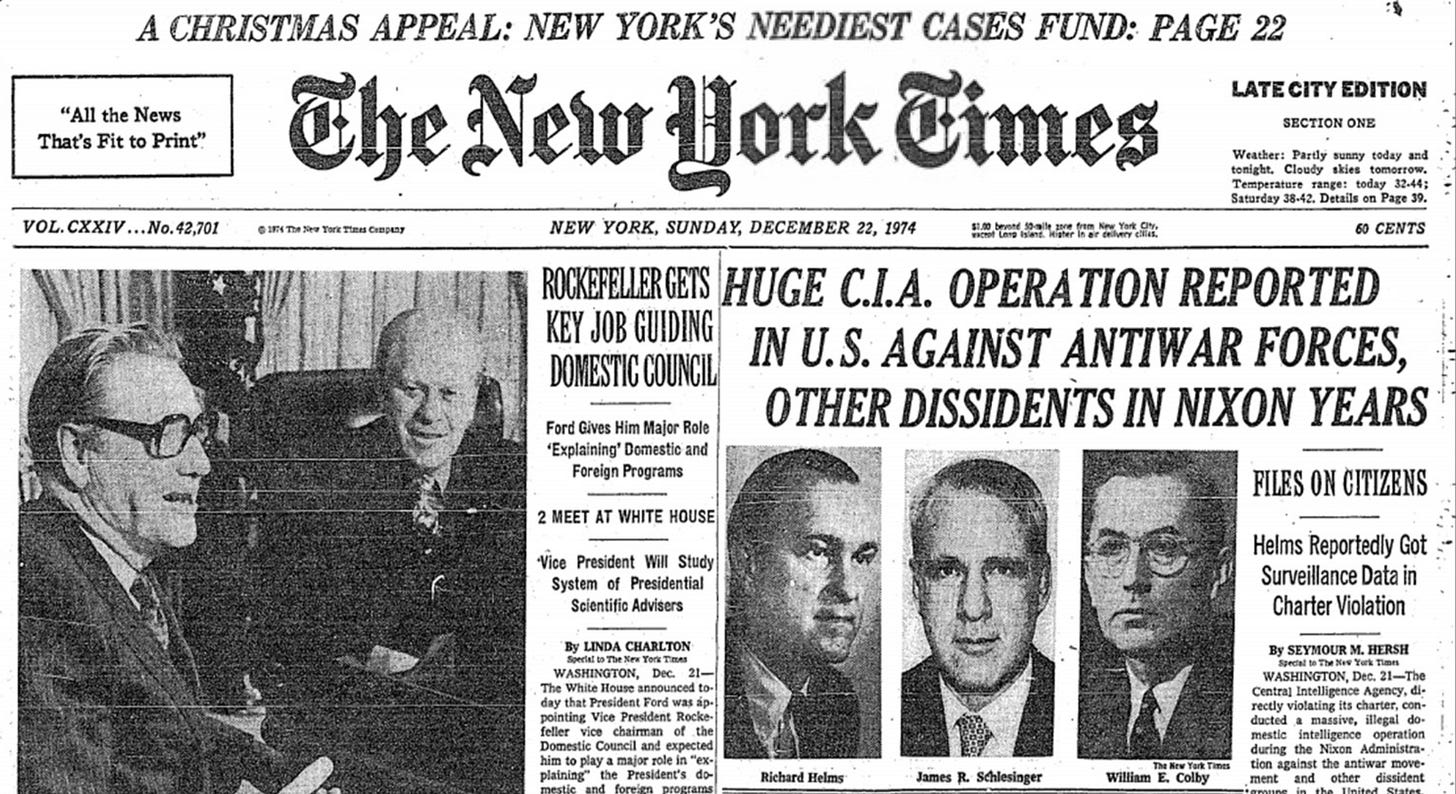New York Times: Trump Invented the Surveillance State

The New York Times runs a jaw-dropper:
Elon Musk may be stepping back from running the so-called Department of Government Efficiency, but his legacy there is already secured. DOGE is assembling a sprawling domestic surveillance system for the Trump administration — the likes of which we have never seen in the United States… What this amounts to is a stunningly fast reversal of our long history of siloing government data to prevent its misuse…
They seem to be building a defining feature of many authoritarian regimes: comprehensive files on everyone so they can punish those who protest.
The guest editorial by Pulitzer-winning investigative reporter Julia Angwin is based on a number of stories, including a whistleblower claim that Musk’s DOGE team was “exfiltrating sensitive data for unknown reasons” at the National Labor Relations Board, and possibly other agencies. If true, it would for sure be an upsetting development on the domestic surveillance front, and should of course be investigated.
The rest of the editorial is a rewrite of American history comical enough to be the bones of a pre-Green Book Farrelly Brothers movie. The assemblage of “comprehensive files” so the state can “punish those who protest” is, openly, a proud part of the FBI’s creation story. J. Edgar Hoover was put in charge of “counter-radical activities” in 1917, and soon after began keeping sensitive information in separate files locked with his legendary assistant Helen Gandy. Hoover grew those files “exponentially” through the infamous Palmer raids and the 1924 founding of the FBI, and that famed cabinet of secrets helped him hold office until his heart stopped on May 2, 1972. The United States has been repeatedly nailed trying to build Hoover’s dream to scale, which the Times knows because it made history in 1975 publishing Sy Hersh’s report on a “Huge CIA Operation” to gather files on at least 10,000 antiwar dissidents and other Americans who fit the category of “those who protest”:

As for the “sprawling domestic surveillance system… the likes of which we have never seen in the United States,” where we have a “long history” of keeping information siloed “to prevent its misuse,” I don’t know where to start. Just the admitted history of surveillance innovations in recent decades gave the United States capabilities beyond the wildest dreams of the “authoritarian regimes” Angwin references. When I called former CIA analyst Ray McGovern about the piece, he described a 2013 meeting with a former Stasi Colonel, whose eyes lit up when told about America’s post-9/11 data-collection programs. “He said, ‘Zis vould be paradise!’” Ray laughed.
No one knows this more than the Times, which boasts decades of exposés on the topic:
From Angwin’s piece:
Over the past 100 days, DOGE teams have grabbed personal data about U.S. residents from dozens of federal databases and are reportedly merging it all into a master database at the Department of Homeland Security. This month, House Democratic lawmakers reported that a whistle-blower had come forward to reveal that the master database will combine data from federal agencies including the Social Security Administration, the Internal Revenue Service and the Department of Health and Human Services. The whistle-blower also alleged that DOGE workers are filling backpacks with multiple laptops, each one loaded with purloined agency data.
Angwin, author of Dragnet Nation: A Quest for Privacy, Security, and Freedom in a World of Relentless Surveillance, obviously knows the Homeland Security Department was created with the specific aim of taking “siloed” information and merging it into a single database. She’s almost certainly familiar with the initial proposal for the DHS, which read, “The Department would fuse and analyze intelligence and other information pertaining to threats to the homeland from multiple sources, including the CIA, NSA, FBI, INS, DEA, DOE, Customs, DOT and data gleaned from other organizations.”
She also knows that list is far from complete: Dragnet Nation is full of examples of the DHS and NSA culling info not just from databases like the Census Bureau but state auto vehicle records, foreclosure records, and private data from “giant companies such as Google, Yahoo!, Verizon and Microsoft.” She mentions the DHS sending $50 million “to state law enforcement agencies to purchase automated license plate readers that allow them to keep tabs on citizens’ movements in ways never before possible,” and even finds a DHS mailer about youth cyber activity that makes anodyne lines like “Know What Your Kids Are Doing” feel creeptastic (there’s even a suggestion about installing monitoring tools that can be used “with or without a kid’s knowledge”).
Today’s Times editorial asserts that “the creation of a huge government database of personal information about U.S. residents is dangerous and very likely against the law,” and cites an instance in the 1960s when Lyndon Johnson was thwarted by Congress in an effort to combine federal dossiers into one “databank.” But Angwin’s 2015 book describes repeated instances in which the executive branch just grabbed whatever data it wanted. In one instance, “the Justice Department authorized the National Counterterrorism Center to copy entire government databases of information about U.S. citizens—flight records, lists of casino employees, the names of Americans hosting foreign-exchange students—and examine the files for suspicious behavior.” The example buttressed one of her main theses: that “suspicionless dragnets had become the new normal.”
The gist of that story, which is really about the ongoing high-speed merger of public and private databases, was also reported on regularly by the Times during that period and the years preceding. They were most attentive in the Bush years when concerns over civil liberties still ran high with Times readers. A few examples:
- 2005: Times reporters James Risen and Eric Lichtblau are criticized for disclosing a warrantless eavesdropping program approved by George W. Bush, one that included mining “vast troves of Internet and telephone communications.” It later comes out, via Times public editor Byron Calame (they still had one then) that the Times held the piece until after the results of the 2004 election;
- 2013: Charlie Savage writes “Facial Scanning is Making Gains in Surveillance,” about testing of the Biometric Optical Surveillance System, or BOSS. Though it “alarms privacy advocates,” there had been “stabs for over a decade at building a system that would help match faces in a crowd with names on a watch list”;
- 2014: Times publishes features on surveillance of Occupy Protests, noting the use of data from 78 “fusion centers” funded by hundreds of millions of DHS dollars. It describes the production of Homeland Intelligence Reports (HIRs), which make use of nontraditional information like local law enforcement records;
- 2021: Times reports that the government buys “commercially available databases” containing geolocation and other data from apps like Muslim Pro, a private service showing the direction of Mecca at prayer time;
- 2021: Times releases McKenzie Funk exposé revealing that ICE “sucks up terabytes of information from hundreds of disparate computer systems, from state and local governments, from private data brokers and from social networks” and “piggybacks on software and sharing agreements originally meant for criminal and counterterrorism investigators.”
Even with bombshells like the 2013 releases of Edward Snowden (whom the Times editorial once praised as having done a great service for his country) leading newscasts and hitting the front pages, the expanded surveillance state has been massively undercovered, for reasons of varying stupidity and cravenness. Data “purloined” by DOGE geeks stuffing laptops into sacks is an arresting image, but we’re decades into a world in which info from your bank, credit card company, or cell phone carrier can be accessed with just a click, no backpacks needed.
The Times at least covered abuses of the “National Security Letter” regime allowing wide-scale vacuuming of private data, though they did it in an odd way, running stories like the 2019 “Secret FBI Subpoenas Scoop up Data from Scores of Companies” where you have to read to the bottom to learn the FBI has been repeatedly chided for abuses of this USA PATRIOT Act enhancement. It was more quiet about abuses of the Foreign Intelligence Surveillance Act that surfaced in 2015, 2016, and 2017, particularly a court report about “significant non-compliance with the NSA’s minimization procedures,” which are designed to prevent officials from intentionally accessing conversations of Americans. When reports of FISA abuse to gain access to communications of people in Trump’s circle became a major part of the Russiagate mess, the Times editorial board denounced the story as a “witch hunt,” and never apologized after Justice Inspector General Michael Horowitz issued a report documenting the FISA-abuse story in excruciating detail. Now, suddenly, the paper is back to deathly concern with the surveillance state.
I don’t love the concept, even in theory, of an administration that’s shown a willingness to go after political enemies using state databases to “identify people who harbor anti-Musk or -Trump sentiment.” But the cascade of accusations more and more resembles the early days of Russiagate, when tales of money laundering, streams of “illicit communications,” connections with Russian spies, abuse of “emoluments,” and other accusations became de rigeur assumptions among reporters, to the point where papers would write blithely about “Trump’s money-laundering problem.”
The story about using AI to hunt “expressions of perceived disloyalty” might be true, but: one allegation is based on “two people with knowledge of the matter,” another quotes an unnamed Veterans Affairs employee describing a movie-like “culture of fear” where “you know something out there [wants] to kill you but you never know when or how or who it is,” and a third is based on more anonymous reports from workers who “think Musk’s team is looking for signs of progressive thinking or disloyalty.”
In the Times piece the “sprawling domestic surveillance system” turns out to be a collection of hypotheticals, e.g. “President Trump could soon have the tools to satisfy his many grievances by swiftly locating compromising information about his political opponents,” and “While [court rulings] restricted DOGE from obtaining personally identifiable data, it remains unclear what happens with data that has been already collected.” These are the journalistic equivalent of ghost stories, hushed guesses by anonymous sources about unknown horrors. There are enough whistleblower complaints about data irregularities that one can believe something is afoot, but we have so much experience with second- or third-hand tales of Trump iniquity (remember when we thought Michael Wolff books were gospel?) that we should know to pause when things still “unclear” become the basis for asserting we’re watching the installation of a surveillance state “never seen in the United States.”
The line that threw me was this quote from longtime civil liberties lawyer Kevin Bankston: “The infrastructure for turnkey totalitarianism is there for an administration willing to break the law.” That’s true, but it’s been true for a while. It’s exactly the danger Snowden warned existed already in 2013.
These stories are starting to have an unpleasantly familiar ring to them. If the first Trump presidency helped rehabilitate the cratered reputation of the intelligence services, the second Trump term is more and more used as a foundation for new versions of American history. We’re told that billionaires never held dominant roles in domestic politics, civil liberties never faced systematic threats, and most preposterously now, we never deployed a “sprawling domestic surveillance system” using centralized databases of “those who protest.” If like me you’ve struggled to identify the irritating new lie in the atmosphere, doesn’t this feel like it?
